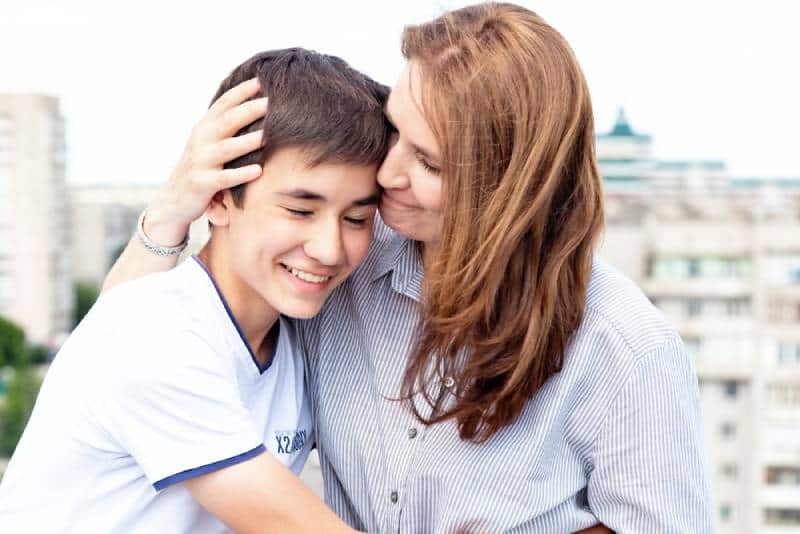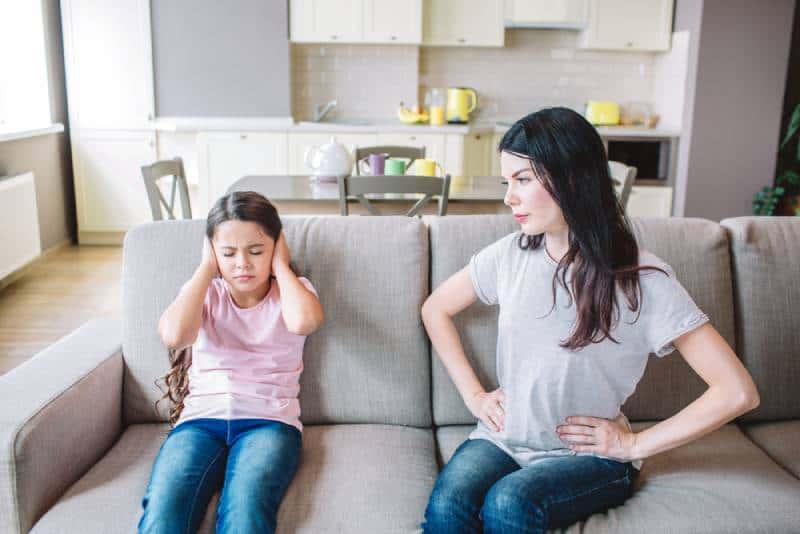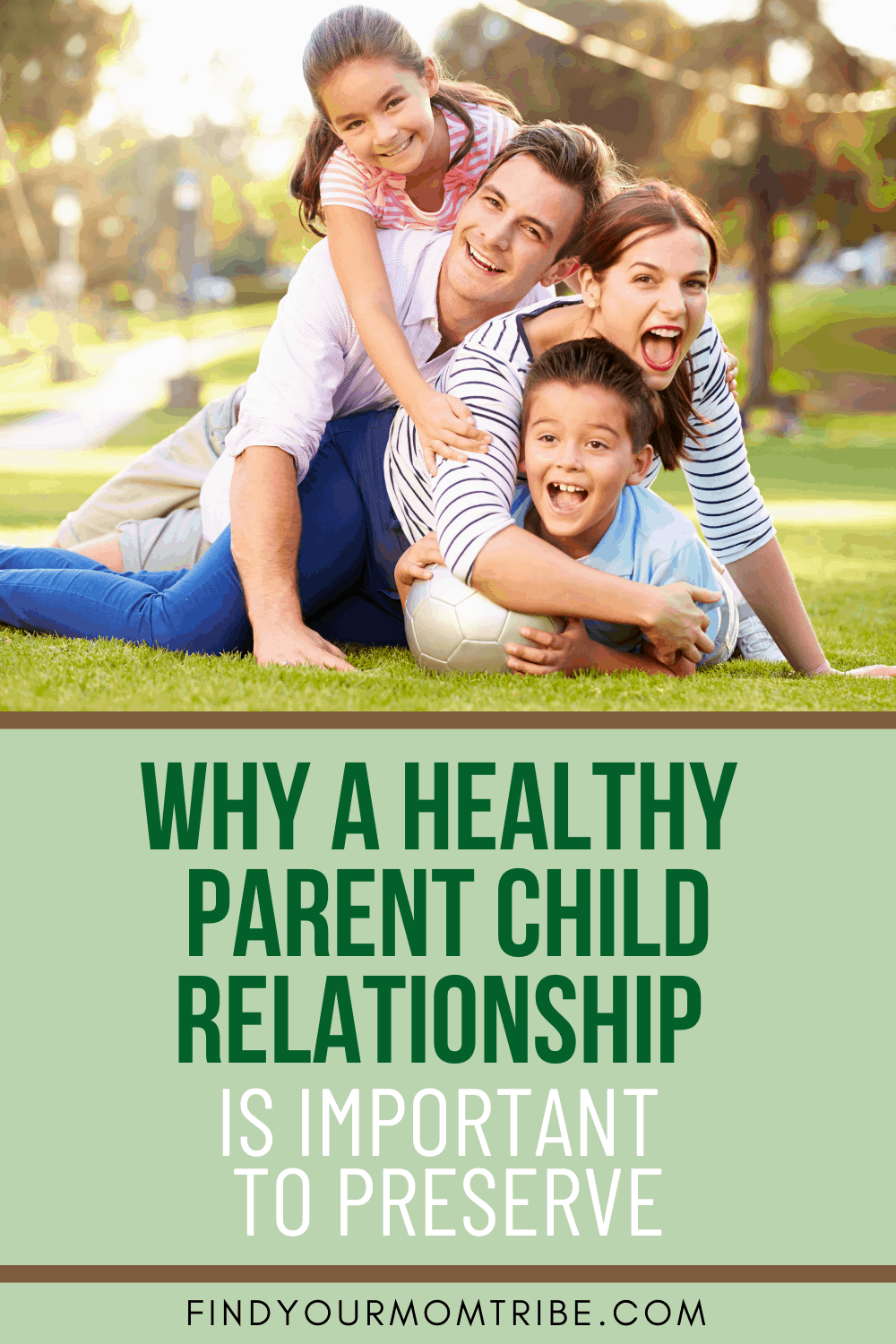A strong parent child relationship is a difficult thing to obtain.
A positive parent child relationship takes time, effort and understanding not just from the child, but the parents themselves if they want to encourage the healthy development of one. It’s a two-way street built upon mutual trust, love, successes, and hardships.
While we may view parenting as a glorious period that helps fill each and every mom and dad with nothing but love, satisfaction, and a general sense of accomplishment, it’s much more than that as it too has its lower moments.
What we see online tends to be rather glorified; spruced up so we think everyone has this ideal parent child relationship, and that puts pressure on us to try and strive toward this perfect life we keep hearing about, one that is pretty much impossible to achieve.
It’s that constant need for perfection, that need to be perfect in everyone else’s eyes that sometimes makes us stray from the path and forget the main reason we’re doing this in the first place, our child’s need for a healthy environment to foster good mental health and emotional development.
It is this need that tends to have the exact opposite effect of what we initially intended, fostering a negative parenting relationship with our own children and often severely impairing their overall well-being.
That neglect of your own child and his needs while taking this wrong direction ends up impacting your child’s behavior, especially if you don’t pay attention to the signs of a parenting style or method that is clearly not clicking well with them.
This leads to longer-term issues that are harder to root out and remedy the more you allow this to go on, such as behavior problems, lack of self confidence and a low self esteem.
But, it’s not just behavioral issues that come into play, many other skills that they should have picked up during early child development end up remaining under-developed like their problem solving skills and overall decision making abilities.
The question is, how is a parent to spot this, realize they were wrong and change their methods? How are they to know what truly is the right path?
The truth is that it varies from child to child and from age group to age group. Your parenting style shouldn’t be the same when you’re raising a toddler in his early years versus when you’re raising a teenager further down the line.
The key is to always listen to what your child is saying and look at how your child’s feelings are affected by certain decisions.
Don’t let yourself get caught up in your ways and in being right all the time, understand that your methods can be imperfect and that you should always seek the advice of the one your parenting methods affect the most, your child.
Creating And Maintaining A Healthy Parent Child Relationship Through The Different Stages Of Your Children’s Development
1. The infancy period – Tender love and care

This, while probably the most physically taxing of all the stages of child development, is the simplest one.
That’s because newborns don’t usually do much other than eat, sleep, cry, and fill a diaper.
Your main job here is to provide your baby with the comfort that he needs to grow properly.
You’re there to do what he currently cannot, and that’s take care of him as well as provide him with as much love as you can.
This is not the period where you fully create the parent child relationship, but it is one where you lay the foundations for it, where you earn your child’s instinctual trust and he forms a secure attachment to you.
2. Toddlerhood – A teacher and a guide

This is where things start to get a bit more interesting. It’s the period where your child learns how to walk and to speak, initially only a few words. They’re a sponge that’s getting ready to absorb all the knowledge being thrown at them, and there’s a lot of it.
That’s because a whole new world has opened up to them now as they try anything and everything they can get their delicate little hands on.
To ensure you build more upon the foundations of a healthy parent child relationship, your duty as a parent during this period is to be their teacher and help guide them through everything new that they encounter.
It is vitally important that you are around them as much as you can be to maintain that level of trust and keep the bond between parent and child going strong.
3. The preschool period – Finding your own style

At this point, your child will be able to walk and talk with no issue and will have developed all of their essential life skills properly, or as best as they have been able to.
This is probably the first time in your child’s life where they get to meet new friends who aren’t your own friends’ kids.
This time they get to pick their own social circle which is their very first step toward becoming independent, as silly as this may sound at their current age.
It is also the first period where your parenting style can start to take form as your child can actually provide feedback for your actions and understand almost everything you’re telling them through words alone.
Your goal during this period of your child’s life is to find a good parenting method that seems to fit best with your child’s interests and one that is going to help him grow and develop into a responsible adult.
4. Elementary school – Friendship and guidance

By the age of 6, your kids have gone through enough mental development and experimentation to know what they want and to properly relay it to you, allowing you to lead simple discussions with them about their wants and needs, as well as answer any questions they may have.
If you’re looking to maintain a healthy parent child relationship here, then what you want to do is sit down and listen to what your kids are saying, but most importantly, to be understanding if something goes wrong.
Yes, a bad grade at school isn’t the best thing, but there is always a reason behind everything and you need to sit down with your child and find out what it is so that you can help them work through it and hopefully overcome the issue.
Don’t try to pressure them to excel or glorify them to a point that it may go to their heads. Recognize their achievements and share in their joy, but don’t go too overboard and don’t ignore them entirely.
At this age they are still looking to impress you if your bond with them is a healthy one, so make sure they have a good role model and a friend to turn to still.
5. The teenage/adolescent years/high school – Giving them space to bloom

Puberty is probably the most dreaded event in a child’s life for a parent because it can end up completely changing their child’s wants and needs.
But, it also signifies the start of a period where the child, or well, the teenager now, yearns for his independence, to find his unique place in the world.
This means trying out a lot of new things and meeting a lot of new people.
From a parent’s point of view, raising teenagers sounds utterly terrifying, but don’t let that influence how you act.
Sure, you may see your teen rely on you a lot less as they get further into this period of their life, but that doesn’t mean that they don’t still look to you for approval. They just do it in a subtler manner.
To keep the parent child relationship stable and successful in this period, you have to do something that is almost a direct opposite of what you were supposed to do up until now and that is to give them some space.
Let them explore things on their own so they can feel more confident in their decisions, feel more accomplished with their successes, and learn from their mistakes.
Though, you should still be there for them when they need you, much like at any point during their development stages.
6. Adulthood – The company of your peers

And here’s the final step of your child’s journey, where your parent child relationship starts to stabilise into whatever you have built it up to be.
What it turns out to be is completely up to you, but now that your kids are all grown up, independent, working and potentially have kids of their own, they can finally relate to the trials and tribulations that you experienced as you raised them.
You’ll have more common ground on which to tread and will ideally treat them more as friends than as your kids.
Your work here is essentially done, I just hope you did an okay job and are proud of it.
The 4 Parenting Styles And Their Overall Effect On Your Child’s Development
As your child grows older and your parent child relationship shifts, you might start noticing specific parenting method trends in how you handle different situations.
These are called parenting styles and there are about 4 of them, each with their own advantages and disadvantages:
1. The neglective style of parenting

Arguably the worst parenting style, evident in the name itself, this type of parenting is one where the parents end up being uninvolved in their child’s every day life.
They’re either never around or they tend to ignore anything their child tries to proudly show them because they’re too busy, too tired, or cannot be bothered indulging the child by turning their gaze toward them.
It can even go as far as to almost never having eye contact with your kids and that’s not something that inspires confidence in young children’s minds.
Rather, it achieves the exact opposite and only serves to create a lack of self-confidence in younger children to the point where they start ignoring any assigned duties because nobody seems to notice when they do them, this includes schoolwork which then, in turn, affects their grades.
It can also have a severely negative impact on their social development as they’re less confident in themselves so they rarely ever decide to speak or to seek new friends out as they lack the relevant social skills to do so.
In the case of older children, they’ve probably spent time so distanced from any social activity that they develop completely anti-social behavior.
While this sounds horrifying and you may think that only bad parents display this sort of parenting style, there are some really good parents who end up inadvertently falling into this category too.
These are the people who have kids but end up falling on hard times so they have to work multiple jobs to help support their children.
While a noble act of parental love, it ultimately leads to creating a growing divide between the parent and their kids because they end up not being there for them most of the time due to long working hours.
And, when the parent does get home, they are too tired or too unfocused to be able to interact with their kids which leads to unintentionally becoming a neglectful parent.
My personal advice if you see yourself in this description is to try making as much time for your kids as possible, look into cutting down on some costs so you don’t have to earn so much just to keep the household running.
As important as money is, having a proper child bond with you is equally as relevant, if not more.
And, if you are yet to become a parent and you cannot even find time for yourself at the moment, sort your life out before delving into parenthood.
It’s not a minor time commitment, I’ll tell you that.
I had to pause my teaching career and find alternatives by being a stay at home mom and becoming a blogger just so I could be there for my kids and avoid this pitfall myself and I don’t regret my decision whatsoever as they’re growing into polite young children who are their own people.
2. The permissive style of parenting

While seemingly ideal on the surface, this style of parenting also known as indulgent overly indulges young kids and doesn’t establish boundaries at just about any point of the child’s development and if it does, it’s usually too flimsy and unsupported.
It has the problem of allowing your kids to get away with too much and be allowed anything they ask for which more often than not leads to them becoming spoiled.
It is a style where the parent focuses so much on fulfilling the child’s needs at any point in time that they turn into more of a servant than a role model.
It’s because they think that giving them everything and more will make their kids love them when, in reality, it just ends up making the kids use them to their own advantage.
If it goes on for too long, it might lead to a point of no return where your kids simply run the house instead of you and that certainly won’t do them any good in their overall upbringing since there will barely be a parent child relationship there to begin with.
They’ll expect everything to be handed to them on a silver platter, and, if it isn’t, they’ll simply throw tantrums as they didn’t learn how to deal with restrictions in a healthy and socially acceptable manner.
Not to mention that, if the parent isn’t there to be the role model, they might turn to someone else. Someone who might simply end up taking them down completely the wrong road as they pick up numerous bad habits which are a nightmare to get rid of.
The kinds of parents who make the mistake of practicing a permissive style of parenting often tend to be parents who think material possessions solve everything and who put their child on too high a pedestal.
But, there are also some parents with genuinely good intentions who simply came into parenthood not understanding that always saying yes is bad too.
These are usually the people who may have been the victims of an authoritarian parenting style in their childhood where they weren’t allowed much and weren’t allowed to speak up since their parents thought they knew best.
Again, I’ve also trod into the territory of permissive parenting myself as one of my parents ended up being a bit of an authoritarian and a codependent parent without realizing it.
So I tried being the exact opposite, but thankfully my fellow moms, who had more experience than me at the time, noticed this and helped me correct my course before it was too late.
3. The authoritarian style of parenting

This particular style of parenting is not one that evokes fond memories. It’s a parenting style that is almost the complete polar opposite of the permissive one.
It’s one where the parent demands complete and total authority over any matter that concerns their child to the point that the child himself doesn’t even get to have a say in the matter.
It is a style where the parent thinks they’re always right and that they’re the only ones who know what’s best for their kids.
Certainly not the best way of going about child rearing now, is it?
While yes, kids need discipline in their lives to know right from wrong, too much discipline just ends up making them lose their sense of self entirely or creates a scenario where they go against the grain so much so that even the most relaxed parent would not like the result, and yet most authoritarian parents will almost never blame themselves for it.
That’s because the people who employ this style of parenting are usually the kind of people who didn’t succeed in their own dreams and are now trying to pass them along to their kids, whether they want to or not.
They show a complete disregard for the child’s needs and his well being as they try to replace them with their own.
And usually, any sort of deviation from the route they carved out for their kid is met with heavy reprimanding and serious discipline, so much so that the child loses any sort of individuality and never realizes his self-worth, leaving him an empty shell of what he could’ve potentially become.
While it might be a grim depiction, many kids end up being crushed under the pressure that their parents exert on them when using the authoritarian style and just end up conforming to make life easier for them.
Either that or the kids end up snapping at some point because they are just fed up with the oppressively smothering way that they’re being treated, causing an unhealthy divide in the parent child relationship that will rarely ever be mended.
But, as with all other styles of parenting, the authoritarian style is easy even for the well-meaning parent to slip into.
Those parents are usually the ones who are a bit too overprotective of their child and are worried that anything and everything will hurt them.
While the intent is genuine concern for their kids, when overprotectiveness goes too far it can end up being more detrimental than beneficial for the child, and it can essentially keep them isolated from the world.
The child ends up never experiencing new things and grows up sheltered and naive, too afraid to take a step forward because it has been ingrained in him that nearly everything is bad unless his parents say otherwise.
He never ends up truly enjoying himself and may never realize it until it’s too late.
As I mentioned earlier, one of my own parents ended up being like that without realizing it and things only improved once I confronted them about it.
Luckily for me, the parent was understanding and mended their ways and we’ve been on good terms ever since. Other kids might not get so lucky though…
4. The authoritative style of parenting

The last and generally the most ideal one of the bunch is authoritative parents because they find the middle ground between being permissive and authoritarian, taking the best of both and mixing it into what is currently arguably the best parenting style.
This style is also known as democratic parenting.
But that’s not all, they also respect their child’s needs and views and always ask them for input when a matter concerns them.
They treat them as people, as equals rather than just kids as they too can have some rather insightful outlooks on different things, you’d be surprised.
They reward good behavior just as much as they punish the bad, but they never use any sort of physical punishment on their kids as that’s counter-intuitive to what one should be teaching their children.
No, instead they sit down and talk to their child, explain exactly why what they did was wrong, and why some socially unacceptable behavior isn’t healthy.
They recognize all the deeds that their children do, the good and the bad, and then use that to help guide them down the path their child wants to go down and help out in whatever way they can.
They’re honest with their kids which allows them to form a secure relationship with them, one of mutual trust and respect.
They lead by example and serve as great role models for their kids to look up to, allowing for a healthy parent child relationship to blossom, one that will last them until even after their kids grow into fully fledged adults and move out.
That said, it’s not easy to stay on the route of the authoritative parent. You’ll be met with many challenges that make it easy to slip off the yellow brick road, but those who manage to stay the course end up being handsomely rewarded.
A Warning: Overly Positive Parenting Isn’t Helpful

Now, you may be picking up from this article that all you need to do is to be approving and positive in your parent-child interactions to secure a healthy parent-child relationship between you and your kids.
While that may be true, it is only so up to a point.
Being overly positive and allowing anything and everything without a safety valve to regulate inappropriate social behavior can lead to behavioral issues down the line, problems with the child’s sense of self-regulation or a complete lack thereof, and total insubordination.
This usually falls into the permissive parenting style, one which you’d want to avoid as much as you can, especially in your kid’s early childhood.
The key is to balance it out by setting down some ground rules. Nothing too harsh, but still fair. You have to know when to be strict, but understanding and to always stand firmly by the punishments that you dole out.
You need to punish bad behavior, but reward good behavior just as well. In fact, if you do the latter more they may be more inclined to do the right thing rather than the wrong one.
And when you do punish them, sit down with them and explain your reasoning behind that decision. It’s not helpful if they don’t know why what they did was bad and it most certainly won’t help them avoid doing it in the future if it isn’t properly explained.
Yes, it’s not a pleasant thing to do at any point during your parenting career, but it’s a necessary one. Your kids may not like you for these decisions, but if you didn’t make them in the first place, they wouldn’t respect you.
And the key to happy parenting is to retain that respect in your kids for as long as you can while also treating your kids in the same manner.
Look at your children as people with their own thoughts and ideas because that’s what they are, not some youngsters who don’t know what they’re talking about. Their input is just as valuable.
This is why the authoritative parenting style is the preferred one when raising kids and tends to be the one with the most success out of the four.
In Conclusion
There is no perfect parent child relationship as the image of a successful one greatly varies from parent to parent and from child to child.
What is important to remember is to treat your child with the proper respect that they deserve, to teach them right from wrong while taking their views and opinions into account.
Work around their thoughts, not your own and help shape them into an individual they can be happy being and you can be happy with raising.
Also note that a healthy parent child relationship isn’t just between the child and one parent, it takes two to tango and co-parenting is key to greatly improving the odds of your child growing up to be a fully functioning adult.
READ NEXT: Old Versus Modern Parenting: Was It Better Then Than It Is Now?
Like this post? Please share or pin it for later. You can also stay in the loop and follow us on Facebook, Instagram or Pinterest.

This post contains affiliate links. Please see our full disclosure for more info.

